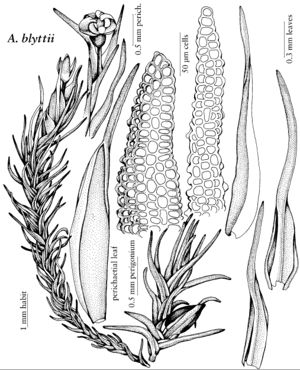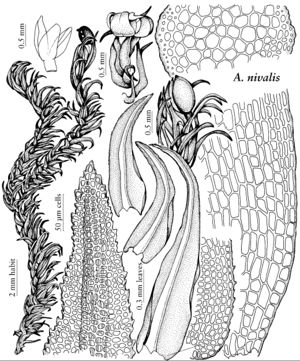FNA>Volume Importer |
imported>Volume Importer |
||
| (3 intermediate revisions by 2 users not shown) | |||
| Line 34: | Line 34: | ||
|family=Andreaeaceae | |family=Andreaeaceae | ||
|illustrator=Patricia M. Eckel | |illustrator=Patricia M. Eckel | ||
| + | |illustration copyright=Flora of North America Association | ||
|distribution=Cosmopolitan. | |distribution=Cosmopolitan. | ||
|reference=None | |reference=None | ||
| Line 39: | Line 40: | ||
|publication year= | |publication year= | ||
|special status= | |special status= | ||
| − | |source xml=https:// | + | |source xml=https://bitbucket.org/aafc-mbb/fna-data-curation/src/2e0870ddd59836b60bcf96646a41e87ea5a5943a/coarse_grained_fna_xml/V27/V27_109.xml |
}}<!-- | }}<!-- | ||
-->[[Category:Treatment]] | -->[[Category:Treatment]] | ||
Latest revision as of 21:24, 5 November 2020
Plants dark green to black, small to large, often in dense turf. Stems erect, irregularly branched, bearing rhizoids at base; central strand absent. Leaves erect or secund, sometimes falcate-secund, short- to long-lanceolate or panduriform; costa absent or single or branched, narrow to broad, percurrent or ending before the apex; in section of uniform cells, lamellae absent; margins plane to weakly incurved, seldom recurved; laminal cells short throughout or occasionally elongate in leaf base, 1-stratose or 2- to multistratose. Specialized asexual reproduction rare, as filamentous gemmae from laminal cells. Sexual condition usually autoicous, mainly cladautoicous but occasionally gonioautoicous or dioicous; perichaetial leaves commonly differentiated, larger, convolute-sheathing. Sporophytes terminal on an elongate gametophytic stalk, the pseudopodium. Seta essentially absent. Capsule erect, elliptic, opening by usually 4 lateral longitudinal valves; stomata, annulus, operculum and peristome absent. Calyptra tiny, campanulate-mitrate, often fugacious. Spores spheric, oval or tetrahedral, small to large, 10 to occasionally more than 100 µm, papillose.
Distribution
Cosmopolitan.
Discussion
Genus 1, species ca. 45 (11 in the flora).
The Andreaeaceae shares with Sphagnaceae the sporophyte raised on a pseudopodium, but the spore sac is derived from the endothecium, not the amphithecium as in the latter family. The spore sac arches over the massive, persistent columella. The longitudinal valves bulge open when the capsules are dry, closing when wet. Erect, thallose protonemal appendages are common and distinctive.
Selected References
None.

